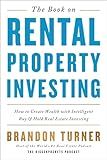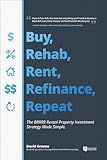Best States for Real Estate Investment to Buy in November 2025

The Book on Rental Property Investing: How to Create Wealth With Intelligent Buy and Hold Real Estate Investing (BiggerPockets Rental Kit, 2)



Buy, Rehab, Rent, Refinance, Repeat: The BRRRR Rental Property Investment Strategy Made Simple



Your First 365 Days in Real Estate: How to build a successful real estate business (starting with nothing)



Exactly What to Say: For Real Estate Agents



The Psychology of Money: Timeless lessons on wealth, greed, and happiness
- PERFECT GIFTING OPTION FOR BOOK LOVERS.
- IDEAL COMPANION FOR AVID READERS ON THE GO.
- COMPACT DESIGN MAKES IT TRAVEL-FRIENDLY.



The Millionaire Real Estate Investor
- LEVERAGE LOCAL MARKET TRENDS TO ATTRACT SAVVY INVESTORS.
- OFFER EXCLUSIVE INSIGHTS FOR SUSTAINABLE PROPERTY GROWTH.
- PROVIDE EXPERT GUIDANCE ON MAXIMIZING ROI IN REAL ESTATE.


When it comes to deciding which state is best to invest in real estate, Massachusetts and Missouri both offer unique advantages and considerations.
Massachusetts, located in the New England region, is known for its strong economy and thriving real estate market. The state boasts several economically robust cities, such as Boston and Cambridge, which are home to prestigious universities, innovative tech industries, and a skilled workforce. This creates a high demand for housing and commercial properties, making Massachusetts an attractive investment option. Additionally, the state has a history of steady population growth and limited available land, ensuring that real estate retains its value over time. However, it's important to note that the high cost of living and property prices in Massachusetts may present a barrier to entry for some investors.
On the other hand, Missouri, situated in the Midwest, offers its own set of advantages for real estate investment. The state has a more affordable housing market compared to Massachusetts, with lower property prices and a lower cost of living. This affordability makes it easier for investors to enter the market and potentially achieve higher cash flow and returns on investment. Missouri also has diverse cities like Kansas City and St. Louis, which offer strong job markets, cultural attractions, and a growing population. These factors contribute to a steady demand for rental properties and a stable real estate market.
Ultimately, the choice between Massachusetts and Missouri depends on various factors, including your budget, investment goals, risk tolerance, and personal preferences. Conduct thorough research, consider local market trends, economic factors, and your own investment strategy before deciding which state is the best fit for your real estate investment goals.
What is the historical growth rate of real estate values in Massachusetts?
The historical growth rate of real estate values in Massachusetts has varied over time and can be influenced by various factors such as supply and demand dynamics, economic conditions, and population growth. According to data from Zillow, over the past decade (2011-2021), the annual average growth rate of home values in Massachusetts has been approximately 4.5%. However, it is important to note that this number represents an average and that there may be significant variations depending on the specific location and timeframe considered. Real estate markets are subject to fluctuations, and historical growth rates do not guarantee future performance.
How to assess the demand for rental properties in Massachusetts?
To assess the demand for rental properties in Massachusetts, you can consider the following steps:
- Study Population Growth: Look for recent population data and growth trends in different regions of Massachusetts. Areas with a growing population tend to have increased housing demand.
- Analyze Employment Trends: Evaluate the job market and employment opportunities in the state. Areas with strong job growth, particularly in industries popular in Massachusetts like technology, healthcare, and education, are likely to have a higher demand for rental properties.
- Research Rental Vacancy Rates: Find data on rental vacancy rates in different areas of Massachusetts. Low vacancy rates indicate a high demand for rental properties as the market is saturated with tenants.
- Examine Supply and Demand Dynamics: Compare the supply of rental properties with the demand in various locations. If supply is consistently low in a particular area but demand remains high, it indicates a strong housing demand.
- Monitor Rental Price Trends: Keep an eye on rental price trends in different regions of Massachusetts. Rising rental prices often indicate an increase in housing demand.
- Observe Rental Listing Activity: Analyze the frequency at which rental properties appear on websites, local listings, or real estate platforms. A high number of listings and quick turnaround times can indicate a strong rental market.
- Research Student Housing Demand: Massachusetts is home to numerous colleges and universities, which can significantly impact rental demand in areas surrounding these educational institutions. Research the student housing market and the number of students looking for rentals.
- Evaluate Local Development Plans: Research any upcoming infrastructure or development projects in areas of interest. New infrastructure or commercial projects can indicate a potential increase in demand for rental properties.
- Analyze Rental Property Returns: Evaluate rental property performance metrics, such as rental yield and occupancy rates, to gauge the demand and profitability of rental investments in different areas.
- Seek Expert Opinions: Consult with local real estate agents, property managers, or industry professionals who have experience in the Massachusetts rental market. They can provide insights and help assess the demand in specific neighborhoods or regions.
By combining these research methods and data analysis, you can gain a comprehensive understanding of the demand for rental properties in Massachusetts and make informed decisions.
How to find foreclosure properties in Massachusetts?
There are several ways to find foreclosure properties in Massachusetts:
- County courthouse: Visit the county courthouse in the area where you are interested in buying a foreclosure property. Check the public records section for foreclosure filings, auctions, or notices.
- Online foreclosure listings: Many websites provide listings of foreclosure properties. Websites such as RealtyTrac, Zillow Foreclosure Center, and Auction.com offer comprehensive foreclosure listings for Massachusetts.
- Local newspapers: Check the classified section of local newspapers, specifically the legal notices or sheriff's sales sections. These sections often list foreclosure auctions and sales.
- Real estate agents: Contact local real estate agents who specialize in foreclosure properties. They have access to multiple listing services (MLS) that can provide information on foreclosure properties.
- Real estate auctions: Attend local foreclosure auctions held by banks, local governments, or private auctioneers. These auctions provide opportunities to bid on foreclosure properties.
- Foreclosure assistance programs: Some foreclosure assistance programs, such as the Massachusetts Housing Finance Agency (MHFA), offer resources and programs to help buyers find foreclosure properties at affordable prices.
Remember to thoroughly research any foreclosure property you are interested in. Conduct inspections, check property records, and consult with professionals like real estate attorneys or home inspectors before making a purchase.
What is the average property tax rate in Massachusetts?
The average property tax rate in Massachusetts is approximately 1.13%. However, it is important to note that property tax rates can vary significantly depending on the town or city within the state.
